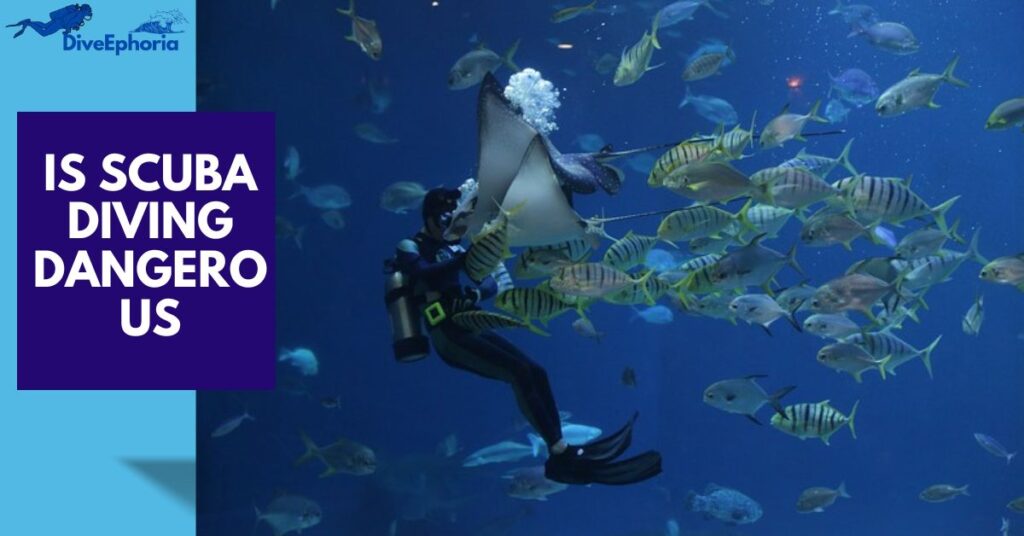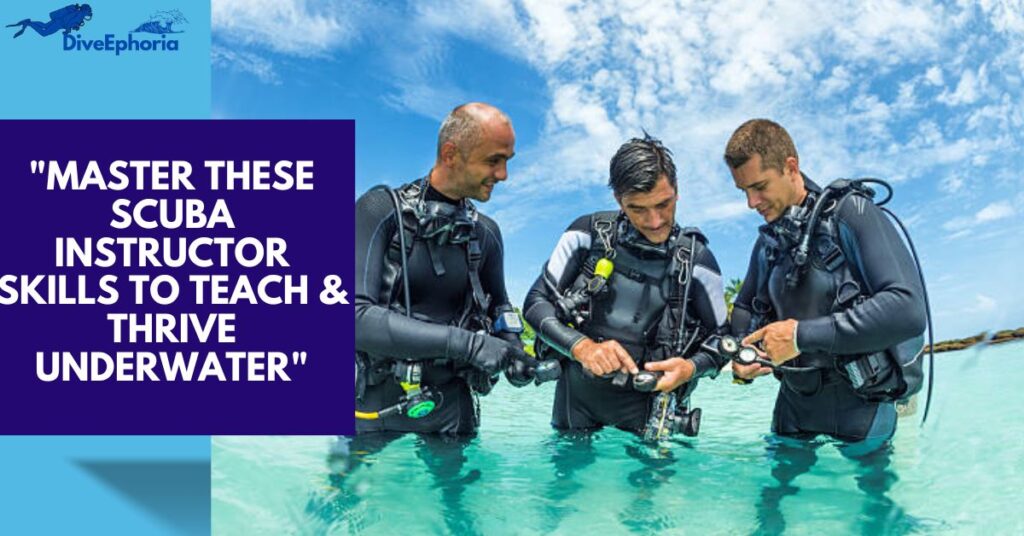
Introduction
Becoming a scuba diving instructor is a dream job for many ocean lovers—but it takes more than just passion and diving certifications to succeed in this role. One of the biggest challenges aspiring instructors face is realizing that teaching others to dive safely and confidently requires a whole new set of skills—both in and out of the water. Without mastering these scuba diving instructor skills, even experienced divers can struggle to manage student anxiety, respond to emergencies, or adapt to unpredictable underwater conditions.
That’s where this guide comes in.
Whether you’re a certified diver considering the leap into teaching, or you’re already on the path to becoming a professional instructor, this article is designed for you. We’ll break down the essential scuba diving instructor skills you need—not just the technical diving abilities, but also the leadership, communication, and problem-solving strengths that define great educators underwater.
By the end of this article, you’ll understand exactly what it takes to thrive as a scuba diving instructor, how to develop and showcase your skills, and what to expect from this adventurous, fulfilling career path.
What Are Scuba Diving Instructor Skills?
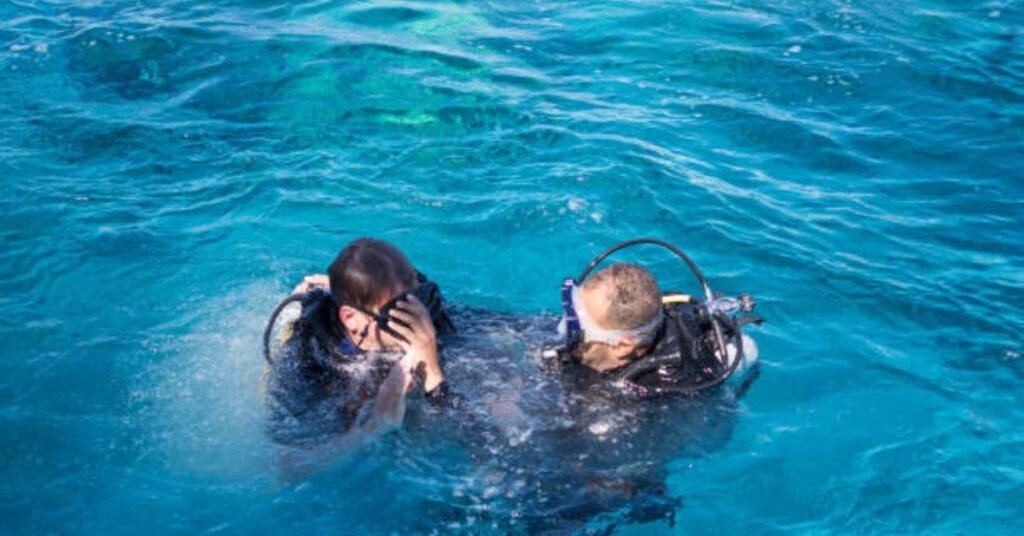
Scuba diving instructor skills refer to the unique combination of technical expertise, teaching ability, safety awareness, and interpersonal strengths required to train and guide new divers. These skills go beyond personal diving competence—they encompass everything needed to create a safe, supportive, and effective learning environment underwater.
An instructor must not only demonstrate perfect buoyancy or execute a textbook rescue—they must also explain concepts clearly, manage group dynamics, and make split-second decisions during real-world scenarios. From mastering advanced dive techniques to handling emergencies with calm authority, scuba diving instructor skills form the backbone of every successful teaching experience.
These skills are critical because students place their trust—and often their lives—in the hands of their instructor. Whether you’re leading a beginner through their first open water dive or guiding advanced divers through challenging conditions, your knowledge, communication, and confidence shape how safe and enjoyable the experience will be.
In short, strong scuba diving instructor skills don’t just produce better divers—they save lives, build trust, and create unforgettable underwater adventures.
Essential Diving Instructor Skills (Underwater Skills)
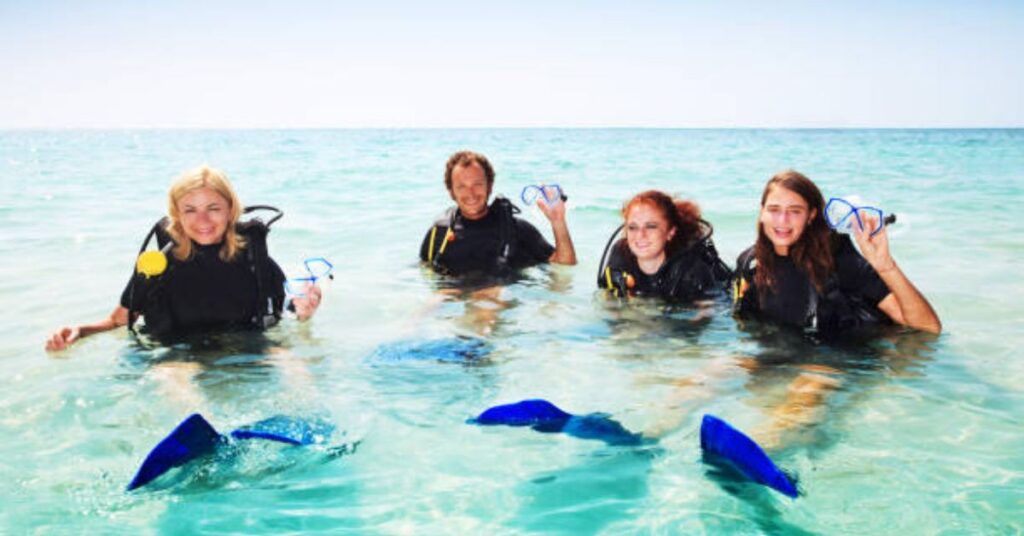
To be an effective educator below the surface, scuba instructors must possess advanced technical proficiency in a variety of dive environments. These scuba diving instructor skills form the foundation of your credibility, safety, and confidence as a leader underwater. Mastering the following specialties ensures you’re prepared to train students in real-world conditions and challenging dive scenarios.
Nitrox Diving
Teaching enriched air diving requires a solid understanding of oxygen exposure limits, dive planning, and gas management. As a scuba diving instructor, you must confidently use and explain Nitrox principles, helping students safely extend their bottom time and understand the benefits and risks associated with higher oxygen mixes.
Deep Diving
Deep dives come with increased risk and complexity, including nitrogen narcosis, faster air consumption, and limited visibility. Instructors must be skilled in deep diving techniques, know how to respond to potential issues, and teach students how to manage pressure-related challenges with calm and control.
Drift Diving
Drift diving can be thrilling—but only when properly planned. Instructors need to teach current reading, buoy deployment, buddy coordination, and entry/exit strategies. Being able to handle and teach in moving water demonstrates a high level of underwater awareness and adaptability.
Wreck Diving
Wrecks are rich with exploration opportunities but often involve tight spaces, overhead environments, and entanglement risks. Instructors must guide students through responsible wreck diving practices, including proper penetration techniques, line use, and respecting marine heritage.
Buoyancy Control
One of the most critical scuba diving instructor skills is mastering buoyancy. Instructors should be able to hover effortlessly, adjust trim, and model precise movements. Teaching students to control their buoyancy not only improves safety but also protects marine life and the underwater environment.
Non-Diving Skills for Scuba Diving Instructors
While technical proficiency underwater is vital, the most effective instructors possess a broad set of scuba diving instructor skills that extend far beyond the dive itself. These non-diving abilities ensure safety, enhance the learning experience, and help you manage both people and equipment with confidence and professionalism.
First Aid & CPR
Every scuba instructor must be certified in first aid and CPR. These life-saving skills are crucial in the event of diving accidents, injuries on the boat, or other emergencies. Being able to respond quickly and correctly in a crisis builds trust with your students and ensures compliance with international diving standards.
Dive Gear & Cylinder Maintenance
Students rely on instructors to help them identify, understand, and maintain their equipment. Knowing how to troubleshoot common gear issues, perform basic maintenance, and inspect dive cylinders for safety is an essential part of a well-rounded instructor’s toolkit.
Boating & Navigation Skills
Whether you’re launching from a shore or a liveaboard, boating knowledge and basic navigation are must-have skills. Instructors should understand boat safety procedures, how to assist with moorings, and how to navigate underwater using compasses, natural references, and dive site maps.
Strong Swimming & Rescue Skills
Excellent swimming ability and rescue competence are foundational scuba diving instructor skills. Instructors must be able to perform surface swims, tow tired divers, and execute rescues in both confined and open water environments. These skills not only keep students safe but also show your professionalism as a leader.
Communication & Group Management
Teaching scuba diving means clearly explaining complex concepts and managing group dynamics—often in high-pressure or distracting environments. Instructors must be strong communicators, capable of reading the room, motivating students, and diffusing stress or confusion calmly and efficiently.
How to Improve Your Scuba Instructor Skills
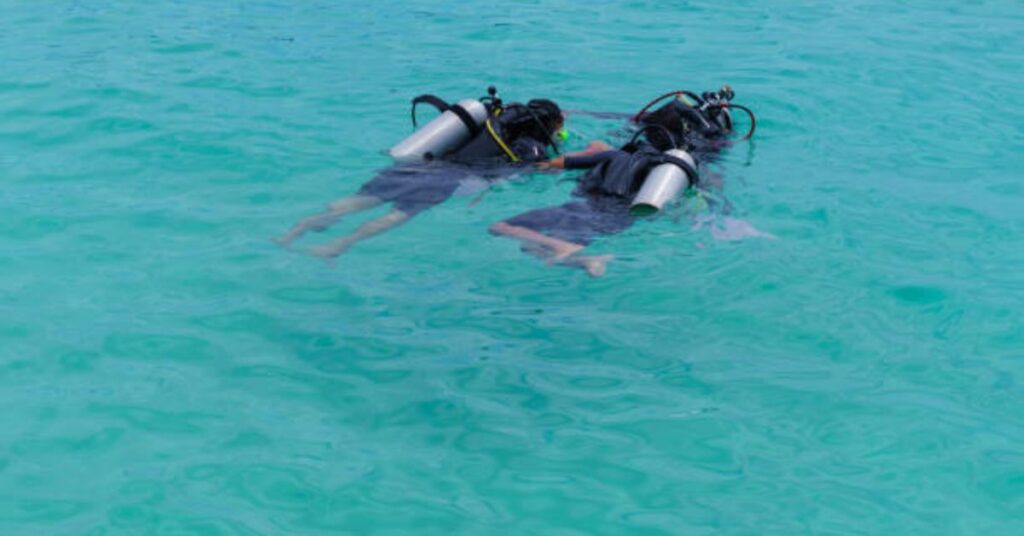
Even the most experienced professionals know that there’s always room to grow. Enhancing your scuba diving instructor skills is an ongoing process that involves self-awareness, continuous learning, and a commitment to delivering the best possible experience for your students. Below are key strategies to help you elevate your capabilities and stay ahead in your teaching journey.
Become More Adaptable
Every dive is different—and so is every student. From unpredictable weather to varying comfort levels in the water, instructors must adapt quickly to changing circumstances. Practice teaching in different environments, tailor your approach to individual learning styles, and stay flexible in your lesson plans. Adaptability not only improves safety but also builds trust and confidence among your students.
Develop Interpersonal & Leadership Skills
A great instructor knows how to inspire, motivate, and lead by example. Focus on strengthening your communication, empathy, and conflict-resolution skills. Whether you’re guiding a nervous beginner or managing a large group, strong leadership helps keep dives organized, safe, and enjoyable for everyone.
Practice Patience and Calm Decision-Making
Scuba instruction often involves high-stress situations—such as equipment malfunctions or student anxiety. Learning to stay calm under pressure, think clearly, and respond with patience is essential. The ability to make quick, confident decisions while maintaining a reassuring presence is one of the most respected scuba diving instructor skills.
Stay Updated with New Techniques and Technologies
The diving industry continues to evolve with new training standards, equipment innovations, and safety protocols. Attend workshops, pursue specialty certifications, and stay active in professional diving communities. Embracing ongoing education ensures you’re always offering the most current, effective instruction to your students.
By continually refining both your technical and soft skills, you’ll not only become a better instructor—you’ll also boost your reputation, increase job opportunities, and make a greater impact in the diving world.
How to Highlight Scuba Instructor Skills on a Resume
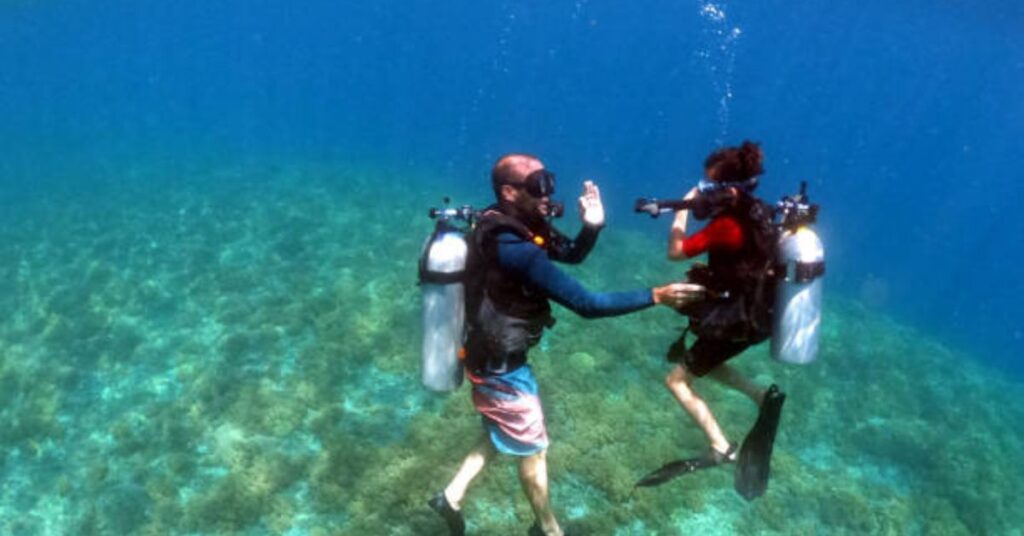
Showcasing your scuba diving instructor skills effectively on a resume can be the key to landing your next job—whether you’re applying at a dive shop, a resort, or an international dive training organization. A well-crafted resume doesn’t just list qualifications; it tells a story of experience, capability, and leadership. Here’s how to present your skills in a way that stands out.
Tailor Skills to the Job Description
Every employer has specific needs, and your resume should reflect that. Start by carefully reviewing the job posting and noting the keywords and required qualifications. Then, align your scuba diving instructor skills with those expectations. For example, if the job emphasizes working with children or beginners, highlight your communication and group management abilities.
Explain Skills Clearly with Examples
Generic claims like “great teacher” or “experienced diver” aren’t enough. Back up your skills with concrete examples. Instead of saying, “Excellent in drift diving,” try, “Led weekly drift dives in Cozumel’s fast currents, instructing divers on safety protocols and buoyancy control techniques.” This gives hiring managers a clear picture of your real-world impact.
Feature Top Skills in Your Professional Summary
Your professional summary is the first thing employers read, so use it to immediately showcase your strongest scuba diving instructor skills. For instance:
“PADI-certified Scuba Instructor with 5+ years of experience leading recreational and advanced dives, specializing in Nitrox, wreck diving, and student-centered instruction. Known for calm leadership, safety-first training, and effective group management.”
Pros and Cons of Being a Scuba Diving Instructor

Pursuing a career as a scuba instructor is a dream for many, offering the chance to turn your love for the ocean into a fulfilling profession. But like any career, it comes with both rewards and challenges. Understanding the pros and cons can help you decide if building your scuba diving instructor skills into a full-time career is the right move for you.
Pros
Travel Opportunities
Scuba instructors are in demand all over the world—from tropical islands and liveaboards to exotic dive resorts. This career offers the chance to live and work in stunning locations, explore new cultures, and dive in some of the most beautiful waters on the planet.
Passion-Driven Work
Teaching diving allows you to share your passion for the underwater world with others. Helping someone take their first breath underwater or overcome a fear of the ocean is incredibly rewarding and meaningful.
High Job Satisfaction
Many instructors report strong job satisfaction due to the active lifestyle, close connection with nature, and the joy of helping students progress. Seeing someone transform from a nervous beginner to a confident diver is a powerful motivator.
Cons
Seasonal Work in Some Regions
In many popular dive destinations, work is seasonal and highly dependent on tourism. This can lead to fluctuations in income and job availability, especially during off-peak months or global travel downturns.
Physically Demanding
Being a scuba instructor involves long hours, heavy lifting, and frequent exposure to sun, saltwater, and varying weather conditions. It requires physical stamina and excellent health to keep up with the daily demands of teaching and diving.
Certification and Liability Requirements
Maintaining professional-level certifications, insurance, and liability coverage can be costly and time-consuming. Instructors must stay compliant with training agency standards and be prepared to handle legal responsibilities in case of accidents or incidents.
In the end, becoming a scuba instructor offers an adventurous and purpose-driven lifestyle—but it’s not without its hurdles. By weighing these pros and cons, you can decide whether you’re ready to commit to refining your scuba diving instructor skills and turning your passion into a profession.
Conclusion
Being a successful scuba diving instructor takes more than just a love for the ocean—it requires a well-rounded set of technical and interpersonal scuba diving instructor skills. From mastering advanced underwater techniques like Nitrox and wreck diving, to excelling in non-diving areas such as communication, leadership, and emergency response, these skills form the foundation of a safe, engaging, and professional teaching experience.
But the journey doesn’t end with certification. The best instructors are lifelong learners—constantly improving, adapting, and staying updated with new techniques, equipment, and industry standards. Whether you’re already certified or just beginning your path toward instructing, your growth as a diver and educator is never truly complete.
✅ FAQs
What skills do you need to be a scuba diving instructor?
To become a scuba diving instructor, you need strong technical diving skills (like buoyancy, deep, and Nitrox diving), plus soft skills like leadership, communication, and emergency response.
How can I improve my scuba diving instructor skills?
You can improve by gaining hands-on teaching experience, staying current with dive certifications, practicing adaptability, and learning from industry mentors.
Is being a scuba diving instructor a good career?
Yes, for those passionate about diving and teaching. It offers travel, high job satisfaction, and purpose-driven work—but it can also be seasonal and physically demanding.


